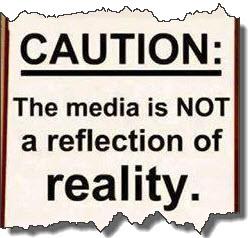
Where do the Facts Begin?
How many media outlets do I need to read in order to find the truth? While most media sources promote the idea of media neutrality, the reality is that “spin is in.” In other words, the same story from different media outlets results in multiple interpretations of the “facts.”
The media has long played an important role in a democracy. In the 18th century, Edmund Burke coined the term “fourth Estate” emphasizing that the press was just as important to a functioning democracy than the other traditional three Estates of parliament. A century later Abraham Lincoln concurred: “Let the people know the facts, and the country will be safe.” The media provides an important means for the public to be informed, allowing them to effectively participate in the democratic process. The public needs to be able to trust that the media is providing them with accurate and credible information. This trust has eroded.
Every news source falls victim to bias, which affects the believability of those sources. For example, one New York Times article about Mitt Romney is titled “Talks With Mitt Romney for Secretary of State ‘Not About Revenge,’ Trump Says” and another article that discusses the same topic from Fox News is titled “Gingrich: ‘I can think of 20 other people’ better suited for secretary of state than Romney.”
There is a general understanding that the media are biased, with 66% of people believing that news organizations are often inaccurate. In the Investor’s Business Daily/TIPP Poll only 25% of registered voters trusted the accuracy of their news stories. Although people are aware of media biases, they need to fully understand how these biases affect their perceptions in order to be fully informed.
Different news sources write to different audiences, and, in order to appeal to their audience, they adopt a certain viewpoint. Although journalists pride themselves on the idea of being “neutral,” the news is “flooded with comments by ‘expert’ sources with diametrically opposed opinions.” When you combine people’s distrust of the main news outlets with the fact that there has been a “21% reduction in traditional political news” it’s apparent that the media feels the need to write to appease its customers. People are self-selecting news that they want to hear, and media outlets are giving their loyal customers what they want to hear regardless of the facts. Many journalists have become mediators at best, and in some cases glorified bloggers.
The most recent hit to the credibility of the media was the development of fake news in the past election. When “nearly 45% of US population get their news from Facebook” it’s critical that people are able to tell the difference between what’s fake and what’s real. A possible reason for the influx in fake news stories is expressed in Partisan Hearts and Minds, where “partisans ignore or deflect information that is inconsistent with their party attachments.” Once again, people are self-selecting the news they read, with little regard for the source, often based on their party affiliations. This affects how informed they are and their ability to effectively participate in the democratic process. With different news stories floating around that may or may not be fake, it becomes hard to distinguish fact from fiction. However, the public needs to be aware of the myth of the informed voter, a theory that states that “it’s nearly impossible for most citizens to be fully informed about all the issues.”
In the midst of this chaos of information, what can be done to salvage the credibility of the fourth Estate? For the media to regain the public’s trust, both it and the public it serves need to acknowledge that media bias is an issue in our society. An impartial media isn’t possible, but it’s important that journalists distinguish between facts and analysis. Media outlets need to find a balance between writing to their audience and making sure the news they are presenting is transparent. Information is the driving force of today’s society, and in order for people to trust what they read, they need to first start by informing themselves on the issues impacting the media today.